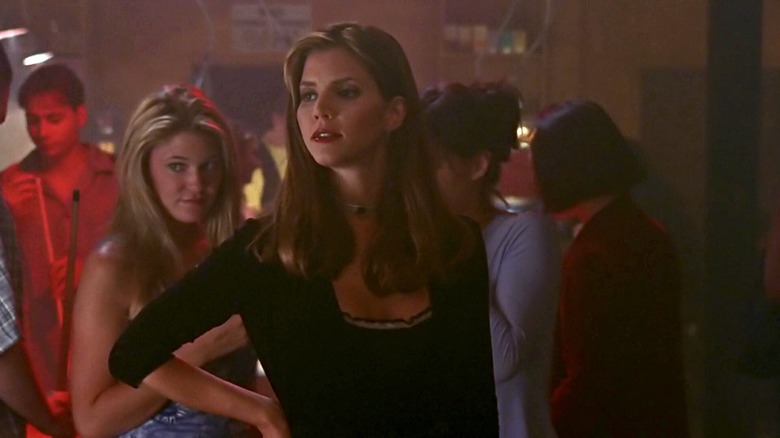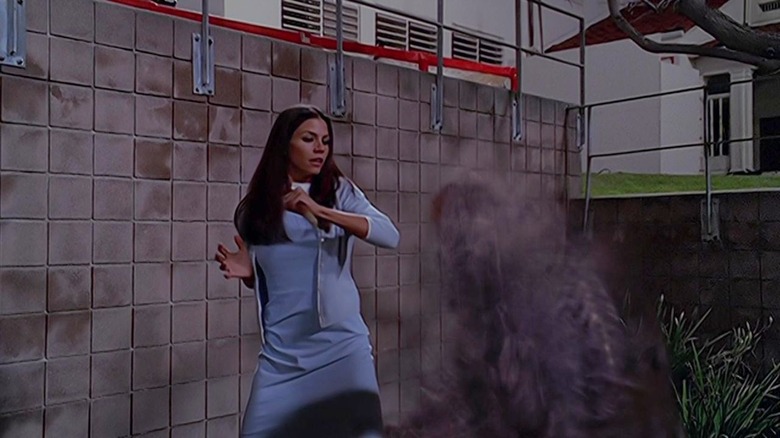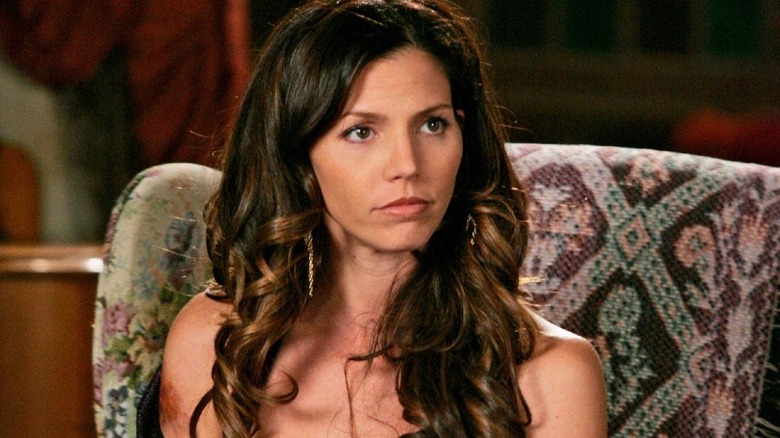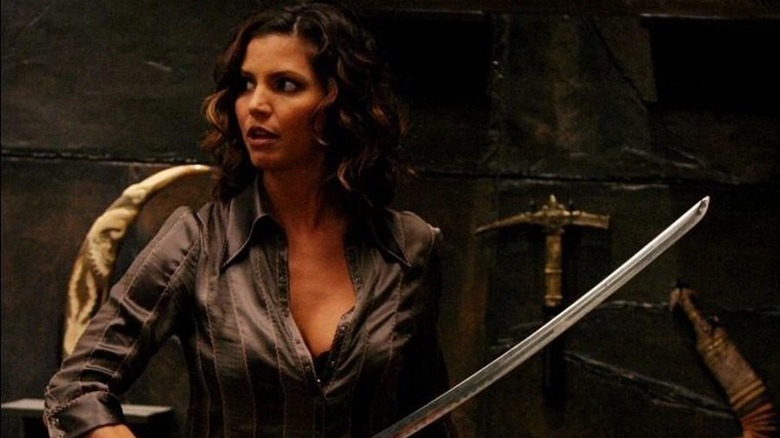Buffy's Charisma Carpenter Begged Joss Whedon To Let Her Stake A Vampire For Three Seasons
"Buffy the Vampire Slayer" turned a classic horror movie trope on its head by making the girl next door the hero of the story, but not everyone could be as powerful as Buffy. In the first three seasons of the show, the blonde heroine's brunette foil was Cordelia Chase, the resident mean girl of Sunnydale High who served as a cynical opposite to the Scoobies' unshakable optimism. Cordelia often played the sassy damsel in distress, and it took a long time for her to develop a supernatural aptitude of her own. It wasn't until the season 3 finale that she finally staked her first vampire — and if actress Charisma Carpenter hadn't spoken up for her character, she wouldn't have staked one at all in all her three seasons as a series regular.
Throughout the first few seasons, Cordelia is more or less unable to defend herself. However, she does display a lot of bravery at times, like when she is targeted by a spell-gone-wrong in "Bewitched, Bothered, and Bewildered," or when Buffy is rendered powerless by witchcraft in the season 2 episode "Halloween." The character definitely shows a lot of growth, but she doesn't fully come into her own until she enters the spin-off series "Angel" following season 3 of "Buffy." However, Carpenter fought to do justice to Cordelia's growth and pushed series creator Joss Whedon to let her finally conquer a demon by herself before her run on the first series ended.
"You know, I had to ask Joss during the episode ['Graduation Day: Part 2,'] the season 3 finale, 'Can I please stake a vampire?'" Carpenter recalled at a French convention in early 2023. "I mean I've been on the Hellmouth for a while now, I think she knows how to take care of herself.' and he agreed, finally."
Cordelia 'grew so much' Carpenter said
Buffy Summers embodies a woman's empowerment to overcome her obstacles as she comes of age, and the vampires, demons, and forces of darkness that she battles with are manifestations of these obstacles. It's a shame that Cordelia was barred from battling this central metaphor for so long, but at least one of her first triumphs in the world of the supernatural came at a natural turning point as she moved from one series to the next.
"My character Cordelia grew so much," Carpenter said at a "Buffy" cast reunion (via People). "[She] became more fleshed out and more human and understood the pain of the world and what her purpose was and she grew to be more lovable and likable."
However, most of Cordelia's growth happened in "Angel," which is why Carpenter prefers the spin-off to the original series. "I think for me I enjoyed 'Angel' more because [Cordelia was] more me," she reflected during the panel at Paris Fan Festival:
"Where I got to explore Cordelia in a deeper way, more fleshed out, more empowering. I got to fight [...] I think when I moved to 'Angel,' there were all the things I loved about being bad, all the sassiness and all of that, but on top of that, I got to fight. On top of that, I got to fall in love and be brainier, and also exercise my deep-seated desire to be on a sitcom."
It wasn't until Cordelia developed psychic powers that she reached her "ultimate growth period," as Carpenter described it to Entertainment Weekly. However, the structure of Angel in itself allowed Cordelia to play against Angel's "dark moody brooding" personality and bring some much-needed levity, as well as explore an oddball friendship between the two characters. For Carpenter, exploring Cordelia's dynamic with Angel was "one of the leading reasons why she grew to be deeper and more complex."
Whedon wrote Cordelia off 'unceremoniously'
Carpenter's character was controversially put into a coma in the penultimate season finale of "Angel," a mysteriously common thread in the Buffyverse's central female characters (Anya, Fred, and Tara also come to mind). Carpenter spoke out against Whedon's conduct on Twitter in 2021, which she described as "casually cruel." When the actress got pregnant, she wrote that the series creator called her "fat" to colleagues and asked her if she was "going to keep it" in a closed-door meeting. As soon as Carpenter had given birth, Whedon "unceremoniously" fired her. All the promise and joy of motherhood "sucked right out," she wrote. "And Joss was the vampire."
It's clear that Carpenter was written off abruptly shortly after giving birth because that's exactly what happens to Cordelia within the world of "Angel" – she gets pregnant via demonic possession and then falls into a coma once exorcised. It's unsatisfying as a viewer and it was offensive to Carpenter, who had dedicated years of her life to evolving this beloved character.
"The way that things ended for her was absolutely not what I wanted for that character that I had played, and all the blood, sweat and tears that went into her," the actress told TV Line. "And also the life that I personally was living and sacrificing for. To bring this character to life and to have it go the way that it did was like a part of me died."
Carpenter is reprising her role in the Audible series Slayers
Even after her unpleasant exit from "Angel," Carpenter still had a lot of love for Cordelia, which is why she was excited to get the opportunity to explore her character again in the Audible series "Slayers: A Buffyverse Story." The series is co-written by Amber Benson, who played Tara in the original "Buffy" run.
Benson and Carpenter are joined in the voice acting cast by Anthony Stewart Head, Emma Caulfield, and James Marsters, reprising their roles as Giles, Anya, and Spike respectively. The unlikely gang of Scoobies is caught in an alternate reality much like the one in the season 3 episode "The Wish" — only this time, Buffy never existed at all.
Benson's narrative provided the "ultimate justice for Cordelia," Carpenter added. No more begging to kill vampires! Cordelia is her fully empowered self, the actress continued:
"The way this story is told and the world-building skills of Christopher Golden and Amber Benson along with [co-director] Kc [Wayland] being there on the day-to-day helping with the performances, it's so satisfying and I am so confident that the fandom is going to be so thrilled. It speaks to the origin story of the shows and that is female empowerment and working in and honoring your purpose, and the humanity and gravity of all that. It's beautiful and touching and funny, and that's all in line with the original Buffyverse story. I'm so excited to bring this to the world and I'm sure Amber, Christopher and Kc are grateful to see it finally being birthed this week."
In a world without Buffy, Cordelia is an able participant in the central metaphor of women's empowerment — battling demons. After playing the damsel in distress for far too long, Benson finally gives Cordelia the arc that she truly deserves.



